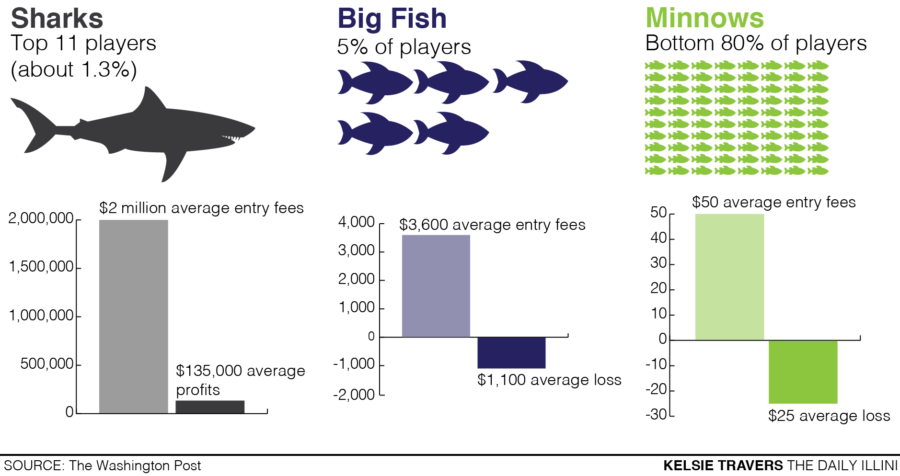Fantasy Fools: The Truth About Daily Fantasy Sports
January 18, 2016
If you have stumbled across a sports channel recently, or any channel targeted for men for that matter, you have probably come across hundreds of ads for both FanDuel and DraftKings. These two companies are the duopoly that control Daily Fantasy Sports.
However, there have recently been arguments at the state government level over whether DFS is gambling. I’m here to calm your nerves, DFS junkies, because the way I see it, DFS should not be considered gambling. Unfortunately though, it’s still unwise to play, because you are still almost certain to end up in the red.
To give a reader’s digest description, Daily fantasy sports are a subset of fantasy sports games. Similar to traditional fantasy sports games, participants compete against one another by assembling a team of professional athletes from a particular league, and earn points based on the actual statistical performance of the players in real-world competitions.
Daily fantasy sports are an accelerated variant of traditional fantasy sports that are conducted over short-term periods, such as a week or single day of competition, as opposed to those that are played across an entire season. The exciting, constant variety of DFS has led to many college students becoming invested in the games, but state governments have recently begun cracking down on the businesses.
In November 2015, New York Attorney General Eric Schneiderman declared that daily fantasy sports constitutes illegal gambling in his home state. In December, Illinois Attorney General Lisa Madigan deemed DFS illegal as well, putting the third-largest DFS market in the country at major risk of being shut down.
If you think that you can win big with DFS, you’re better off hustling your friends at traditional fantasy sports. This is because the ‘minnows’ of the DFS world, the bottom 80 percent of players, pay an average entry fee of $50 and lose half of their cash. Losing $25 isn’t that bad, but the ‘big fish’ of the DFS world lose even bigger than that.
These are the 5% of players that account for one third of the entry fees on DFS. Their results? They lose $1,100 on their $3,600 average entry fees. So where do all their losings go? To the ‘sharks’. The top 11 players on DFS make an average of $135,000 in profit on their average $2 million entry fee.
https://www.washingtonpost.com/news/the-switch/wp/2015/10/12/all-the-reasons-you-probably-wont-win-money-playing-daily-fantasy-sports/.
In his explanation for banning DFS in New York, Schneiderman explained that “each DraftKings/FanDuel wager represents a wager on a ‘contest of chance’ where winning or losing depends on numerous elements of chance to a ‘material degree.’” This is sound reasoning from Schneiderman, but the main argument comes down to whether or not these are truly games of chance, or games of skill. http://espn.go.com/chalk/story/_/id/14100780/new-york-attorney-general-declares-daily-fantasy-sports-gambling
Given that approximately 90 percent of player profits are going to just 1 percent of the players, it would certainly seem that DFS contains elements of skill.
On the flip side, 85 percent of players in DFS lose money — so unless you’re a math wiz, it is time to get out of DFS as fast as humanly possible. If you are just a casual sports fan, the likelihood of making money on these sites are about as good as betting on the Cubs to win the World Series every year. https://www.youtube.com/watch?v=Mq785nJ0FXQ (10:30)
That is because these games has become a full-time job for former investment analysts and statisticians alike. These DFS professionals spend hours each day going through their constructed algorithms to find out the best lineups for each day.
Having never played DFS before, it seems as if there is more skill that goes into these games than putting money in the stock market. When you consider that, it is difficult to argue that DFS is gambling since it is hardly a game of chance given all the statistics and projections that go into it.
These numbers scream to get out now. Unless you enjoy creating software and algorithms in your free time, leave the DFS to the professionals. However, gambling or not, these games has become incredibly addictive, so jumping ship may be harder than you think.
Jason is a senior in LAS.







